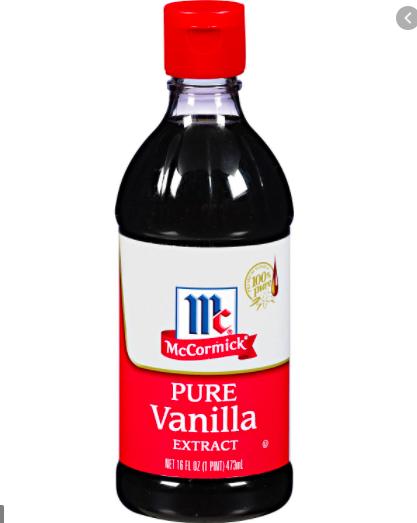My esteemed (1) colleague Dr. Alex Berazow recently wrote a fantastic article about how Johnson & Johnson was strong-armed by predatory lawyers who took advantage of some sketchy data and the scientific ignorance of pro-plaintiff leaning juries. Even the title is great: "Thank You, Trial Lawyers, For Protecting Us From The Scourge Of Baby Powder."
Many species of sharks must keep swimming so they can breathe and it would seem that many species of trial lawyers, arguably a different species – but not by much – must keep suing so they can buy a 2021 Mercedes-Benz S-Class? (2)
I don't really know what kind of vehicle New York attorney Spencer Sheehan drives. Perhaps it's an ice cream truck because Mr. Sheehan is obsessed with vanilla, so much so that he has sued 110 companies alleging that they made phony claims on their labels.
Perhaps Mr. Sheehan is simply a dessert connoisseur and has dedicated his legal wizardry to upholding "(v)analytical" standards in the food industry. Or maybe he's just trying to make judicial history. After all, it's almost certain that a case of this magnitude will make it into future law books, possibly next to Marbury vs. Madison or even the original Miranda case.
Sheehan's valiant crusade against companies that claim "vanilla" is in their products but use "artificial vanilla" is covered in delicious detail in a recent article in Business Insider. Sheehan claimed that he started these cases after "noticing a bottle of A&W Root Beer had a label saying 'made with aged vanilla' on it" and became suspicious. Then the sleuthing and suing began.

Peter Sellers as Inspector Clouseau. Photo: Wikipedia
How's that going?
Not so well. Suits against companies like McDonald's, Chobani, and Trader Joe's are being tossed out left and right by New York courts.
'[T]here has been "increasing impatience" from courts when it comes to the topic.
Tommy Tobin, a master of understatement, and an attorney at Perkins Coie LLP
Duh
Josh Bloom, a chemist at the American Council on Science and Health
Before we get to the science behind this nonsense, let's bring in HuffPost, a splendid source of nonsense science. A 2019 article about artificial vanilla (correctly) pointed out that vanilla extracted from vanilla beans is far more expensive than vanilla made synthetically. But then the science went downhill:
Artificial vanilla, which is more commonly used, is made from a synthetic form of vanillin, the main compound in vanilla beans that gives them their flavor. Synthetic vanillin is made from things like wood pulp, clove oil, and – at one point – the anal glands of beavers. [Emphasis added]
I'm not certain what is found in the anal glands of HuffPost writers, but it's sure not chemistry books. Why? The article makes a (very) common error – that the source of a chemical has any bearing on that chemical's properties. In other words, vanillin, the chemical responsible for the flavor of vanilla, isn't any different whether it is obtained from vanilla beans or wood pulp. Even those of you not blessed with an encyclopedic knowledge of chemistry can probably understand this equation:

But in this case, there is one difference. To many, the vanilla from the beans tastes better than pure vanillin because hundreds of other chemicals come along for the ride during the extraction process. These other chemicals, although they don't taste like pure vanilla, can give the extract a richer flavor. It would not be incorrect to call naturally derived vanilla "impure vanilla."
A 2016 article in Chemical and Engineering News discusses just this:
There is also a taste difference, thanks to tiny amounts of other aromatic components that come from lignin. “They add to the intensity and the roundness of the aroma profile, in effect giving it a stronger and creamier flavor compared to the equivalent amount of petroleum-derived vanillin.” (Emphasis added)
Amie Byholt, U.S. director for sales and marketing for Borregaard (a Norwegian company that makes stuff from wood)
But Ms. Byholt also makes a common error by using the term "petroleum-derived." There is little doubt that this will frighten consumers into thinking that what's in their Nilla Vanilla Wafers comes directly from the pump at an Exxon station. No, vanillin = vanillin = vanillin. It doesn't matter where it comes from. I've even written a book about this. The last time I looked, almost a dozen people had purchased it! Whoo-hoo!

As for Mr. Sheehan, he apparently isn't done clogging up the courts with nonsense suits;
"I have an interest in other consumer issues. I don't want to be pigeonholed."
Who would?? We wish Mr. Sheehan (and his anal glands) nothing but the best in his new endeavors.
UPDATE 3/29/21
A big ACSH thank you to reader Keith T. Ayoob for posting this link, which describes a head-to-head taste of "real" and imitation vanilla. Most people couldn't tell the difference, but the imitation stuff won. Just say yes to petroleum products!
NOTES:
(1) Unfortunately, Alex is now my former colleague. He just left ACSH for another job. Quite a loss, personally and professionally, but we all wish him nothing but the best.
(2) For those of you who might be interested in displaying your wealth, the S-class Benz starts at 94K for the stinky old sedan, while you're going to have to lay down 139 large for the sedan.




